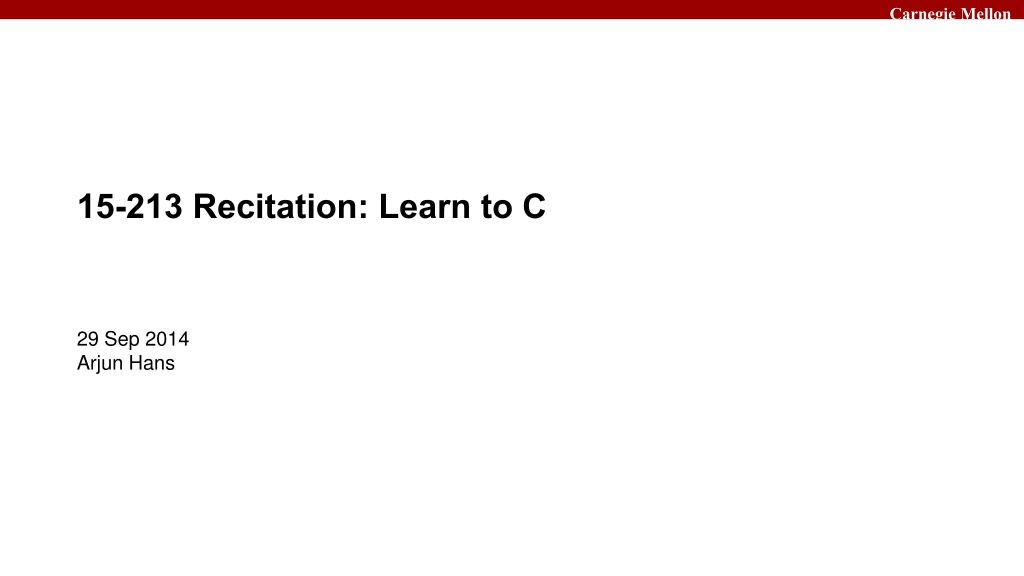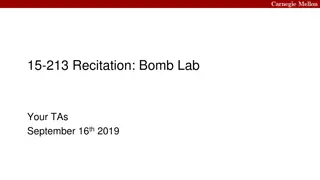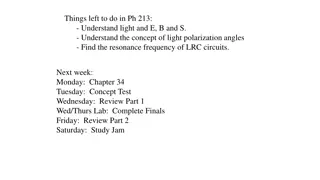15-213 Recitation: Learn to C
In this collection, you'll find exercises and assessments related to C programming from a Carnegie Mellon recitation session. Dive into debugging tools, version control, compilation, and more to enhance your understanding of fundamental C concepts. Plus, test your skills with exercises like identifying bugs and working through code snippets. Don't miss out on the upcoming C-bootcamp for additional learning opportunities!
Download Presentation

Please find below an Image/Link to download the presentation.
The content on the website is provided AS IS for your information and personal use only. It may not be sold, licensed, or shared on other websites without obtaining consent from the author.If you encounter any issues during the download, it is possible that the publisher has removed the file from their server.
You are allowed to download the files provided on this website for personal or commercial use, subject to the condition that they are used lawfully. All files are the property of their respective owners.
The content on the website is provided AS IS for your information and personal use only. It may not be sold, licensed, or shared on other websites without obtaining consent from the author.
E N D
Presentation Transcript
Carnegie Mellon 15-213 Recitation: Learn to C 29 Sep 2014 Arjun Hans
Carnegie Mellon Agenda C-Assessment Best Practices Debugging Tools Version Control Compilation Demo
Carnegie Mellon C Assessment
Carnegie Mellon C Assessment Can you solve all of these upcoming C-exercises effortlessly? These problems test fundamental C-concepts. If not, please come to the C-bootcamp Wednesday October 1st, 8-10 PM, Rashid Auditorium Syllabus Details: Types: Pointers/Structs Memory Management: Malloc/Free, Valgrind Common library functions: string.h, stdlib.h, stdio.h Grab-bag: macros, typedefs, function-pointers, header-guards Make the investment now
Carnegie Mellon Exercise 1a): Can you find the bug? #include <stdlib.h> #include <stdio.h> #include <string.h> int main() { char w[strlen("C programming")]; strcpy(w,"C programming"); printf("%s\n", w); return 0; } int main() { int* a = malloc(100*sizeof(int)); for (int i=0; i<100; i++) { if (a[i] == 0) a[i]=i; else a[i]=0; } free(a); return 0; }
Carnegie Mellon Exercise 1b): Can you find the bug? #include <stdlib.h> struct ht_node { int key; int data; }; typedef struct ht_node* node; // called from other functions // return value is used char *strcdup(int n, char c) { char dup[n+1]; for (int i = 0; i < n; i++) dup[i] = c; dup[i] = \0 ; char *A = dup; return A; } node makeNnode(int k, int e) { node curr = malloc(sizeof(node)); node->key = k; node->data = e; return curr; }
Carnegie Mellon Exercise 2a): Grab-bag #define NEXT_BYTE(a) ((char*)(a + 1)); #define IS_GREATER(a, b) a > b inline int isGreater(int a, int b) { return a >= b ? a : b; } int m1 = IS_GREATER(1, 0) + 1; int m2 = isGreater(1, 0) + 1; long a1 = 54; // &a1 = 0x100 int a2 = 42; // &a2 = 0x200 void* b1 = NEXT_BYTE(&a1); void* b2 = NEXT_BYTE(&a2); What is b1? What is b2? What is m1? What is m2?
Carnegie Mellon Exercise 2b): Grab-bag char* nextChar(char* str) { for (int i = 0; i < strlen(str); i++) { str[i] = str[i] + 1; } return str; } int A[40][30]; int **B = malloc(sizeof(int*) * 40); for (size_t i = 0; i < 30; i++) B[i] = malloc(sizeof(int) * 30); Is sizeof(A) == sizeof(B)? Good code or bad code?
Carnegie Mellon Best Practices Libraries, Robustness, Style Guide
Carnegie Mellon Standard Libraries Get comfortable with commonly used libraries Improve your efficiency Avoid redundancy stdlib.h: malloc, calloc, free, exit, atoi, abs, etc string.h: strlen, strcpy, strcmp, strstr, memcpy, memset, etc stdio.h: printf, scanf, sscanf, etc Use man/online references to learn their usage
Carnegie Mellon Keep it Robust We are writing code for the real world: errors will happen system calls may fail user may enter invalid arguments connections may die but your code should NOT crash! Handle errors gracefully Indicate when errors happen May be recoverable, may have to terminate Remember to free any resources in use Else, suffer the wrath of a thousand unicorns and our sadistic style-grading.
Carnegie Mellon Solution 1: Use CSAPP Wrappers! http://csapp.cs.cmu.edu/public/1e/ics/code/src/csapp.c Has wrapper methods for all core system calls Explicitly checks for return values Calls unix_error if something went wrong void *Malloc(size_t size) { void *p; if ((p = malloc(size)) == NULL) unix_error("Malloc error"); return p; } Copy/paste required wrappers in source code, since we will accept only single files. Definitely include this file in your proxy lab submission!
Carnegie Mellon Solution 2: Check the values yourself! Example: file IO functions fopen: open a given file in a given mode (read/write/etc) fclose: close file associated with given stream fscanf: read data from the stream, store according to parameter format Error-codes: fopen: return NULL fclose: EOF indicated fscanf: return fewer matched arguments, set error indicator May be useful for Cache lab! FILE *pfile; // file-pointer if (!(pfile = fopen( myfile.txt , r ))) { printf( Could not find file ); exit(EXIT_FAILURE); } char c; int x; while (fscanf(pfile, %c %d\n , &c, &x) > 0) { if (ferror (pFile)) { printf ("Error reading from file\n"); exit(EXIT_FAILURE); printf( %c %d\n , c, x); } fclose(pfile);
Carnegie Mellon More Examples: getopt Used to parse command-line arguments. Typically called in a loop to retrieve arguments Switch statement used to handle options colon indicates required argument optarg is set to value of option argument Returns -1 when no more arguments present May be useful for Cache lab! int main(int argc, char** argv){ int opt, x; /* looping over arguments */ while(-1 != (opt = getopt(argc, argv, x:"))){ switch(opt) { case 'x': x = atoi(optarg); break; default: printf( wrong argument\n"); break; } } }
Carnegie Mellon Style Guide We will read your code. We will grade your code. Read the style guide: http://www.cs.cmu.edu/~213/codeStyle.html then read it again
Carnegie Mellon Style Guide Principles Consistency: Whitespace: use for all code-blocks, don t mix tabs/single-spaces Variable Names: camelCase, hyphens, etc Curly-braces: Allman, K&R Bottom-line: choose a set of conventions and stick to them. Clarity: Documentation: approach, algorithmic thinking, etc Naming: variable/function names should indicate their usage Modularity: use helper functions profusely, avoid duplicated code Line-length: 80 characters and no more No magic numbers; use macros/cons
Carnegie Mellon Version Control Git Introduction
Carnegie Mellon Version Control You should use it. Now. Avoid suffering during large labs (malloc, proxy) Basic ideas: complete record of everything that happened in your code repository ability to create branches to test new components of code ease in sharing code with other. A skill that will pay you dividends in the future
Carnegie Mellon Version Control Basics (Git) git init: Create a new repository Indicated by .git file git status: Show working tree-status Untracked files, staged files git add <file_name> Stage a file to be committed (does not perform the commit) git add . stages all files in current directory git commit Make a commit from all the stage files git commit -m Commit message
Carnegie Mellon Distributing your Source Should probably also use a website for hosting a remote repository (github, bitbucket) MUST ensure that your repository is PRIVATE git push: Pushes the local repository to a remote repository git pull: Pushes the local repository to a remote repository git clone: Clone a repository into a new directory git clone <online-repo-name>
Carnegie Mellon Other Git stuff Git is complicated; be careful Run into a problem, look it up StackOverflow Github http://git-scm.com/docs/ man pages Some online tutorials: http://pcottle.github.io/learnGi tBranching/ https://try.github.io/
Carnegie Mellon Debugging GDB, Valgrind
Carnegie Mellon GDB No longer stepping through assembly! Use the step/next commands break on line numbers, functions Use list to display code at line- numbers and functions Use print with variables Use gdbtui Nice display for viewing source/executing commands
Carnegie Mellon Valgrind Find memory errors, detect memory leaks Common errors: Illegal read/write errors Use of uninitialized values Illegal frees Overlapping source/destination addresses Typical solutions Did you allocate enough memory? Did you accidentally free stack variables/something twice? Did you initialize all your variables? Did use something that you just free d? --leak-check=full Memcheck gives details for each definitely/possibly lost memory block (where it was allocated
Carnegie Mellon Compilation GCC, Make Files
Carnegie Mellon GCC Used to compile C/C++ projects List the files that will be compiled to form an executable Specify options via flags Important Flags: -g: produce debug information (important; used by GDB/valgrind) -Werror: treat all warnings as errors (this is our default) -Wall/-Wextra: enable all construction warnings -pedantic: indicate all mandatory diagnostics listed in C-standard -O1/-O2: optimization levels -o <filename>: name output binary file filename Example: gcc -g -Werror -Wall -Wextra -pedantic foo.c bar.c -o baz
Carnegie Mellon Make Files Command-line compilation becomes inefficient when compiling many files together Solution: use make-files Single operation to compile files together Only recompiles updated files # Makefile for the malloc lab driver # CC = gcc CFLAGS = -Wall -Wextra -Werror -O2 -g -DDRIVER -std=gnu99 OBJS = mdriver.o mm.o memlib.o fsecs.o fcyc.o clock.o ftimer.o all: mdriver mdriver: $(OBJS) $(CC) $(CFLAGS) -o mdriver $(OBJS) mdriver.o: mdriver.c fsecs.h fcyc.h clock.h memlib.h config.h mm.h memlib.o: memlib.c memlib.h mm.o: mm.c mm.h memlib.h fsecs.o: fsecs.c fsecs.h config.h fcyc.o: fcyc.c fcyc.h ftimer.o: ftimer.c ftimer.h config.h clock.o: clock.c clock.h clean: rm -f *~ *.o mdriver
Carnegie Mellon Make File Rules Comments start with a # , Commands start with a TAB. Common Make File Format: target: source(s) TAB: command TAB: command Macros: similar to C-macros, find and replace: CC = gcc CCOPT = -g -DDEBUG -DPRINT foo.o: foo.c foo.h $(CC) $(CCOPT) -c foo.c See http://www.andrew.cmu.edu/course/15- 123-kesden/index/lecture_index.html for more details
Carnegie Mellon Demo Time! Putting it all together
Carnegie Mellon Questions?
Carnegie Mellon Credits Inspired by slides from previous semesters, by Art Chang, Anita Zhang, Peyton Randolph, Brandom Lum C-assessment questions taken from 15-122 HW theory problems Library function descriptions taken from http://www.cplusplus.com/reference



















